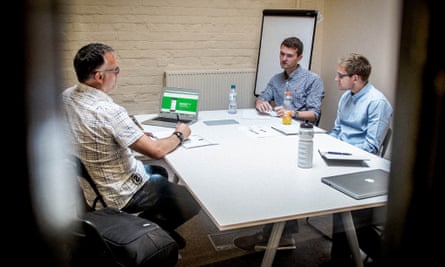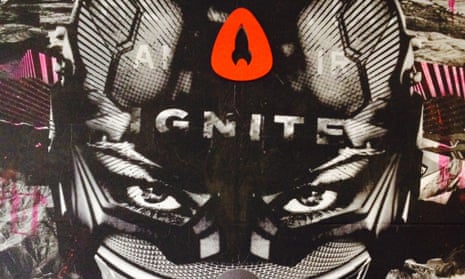“The brogrammer bullish mentality tells you never to take no for an answer, and never quit. The reality is there are a lot of times you should quit, walk away and do something else – because your idea is terrible!”
As chief executive of Ignite, the Newcastle-based startup accelerator programme, delivering a sharp dose of reality to overconfident tech-company founders is sometimes part of Paul Smith’s job. He doesn’t shirk it.
“Just because you’ve identified a problem doesn’t necessarily follow that you’ve created a solution that anybody wants,” adds Smith. “When people are passionate about something, tempers can flare when they hear something like this, but it’s important that they’re challenged.”
Ignite is in its fourth year, and styles itself as a “pre-seed accelerator”. It recruits 10 startups at a time into its programme, providing £18k per team in return for an 8% equity stake, workspace, four months of solid coaching, and ongoing support once they graduate.
Companies from its first three cohorts have raised more than £15m in investment, and according to Smith have a total valuation of £59m, which he says proves the value not just of its willingness to prick inflated expectations, but also its focus on first-time founders.
“We work with first-time entrepreneurs, so we are taking a bigger gamble than many other accelerators. These people are unproven, but we think the biggest gains are going to be made by outliers: the people nobody sees coming,” says Smith.
“We have a higher appetite for risk: we’re looking for teams that haven’t raised money before, and the kind of teams that some of our rivals won’t consider. We’re just looking for smart people who want to make a difference.”
Ignite’s latest cohort included companies exploring programmable wearables, drone architecture and 3D educational publishing, among other areas – a sign that the programme is willing to bet on new technologies as well as unproven teams.
“Some of it may be too early, but that’s exciting. What turns me off is people who have invented Foursquare five years too late. It’s surprising that there are still people who think that a variation on Foursquare will be the next big thing,” says Smith.
“If you look at the big success stories in technology, it’s tech that either changes the rules completely, or which does something really well. Snapchat and the idea that it destroys the photos and messages you send to make the whole experience very ephemeral? That’s changed how we use cameras. While something like WhatsApp does one thing – messaging – incredibly well.”
Smith expects five or six Ignite graduates from the program’s first three years to start moving into Series A funding rounds in 2015, which he sees as validation of the scheme’s focus on backing “outliers”.
Ignite currently gets around 80% of its funding from a network of angel investors including Friends Reunited co-founder Steve Pankhurst, former Virgin Holidays MD Amanda Wills; early Spotify exec Jonathan Forster and Vouchercodes founder Duncan Jennings. The other 20% comes from long-time partner Northstar Ventures.
Smith says that the fact that these backers are prolific investors in technology, and that they are generally based outside the north east, has been important in changing the way that Ignite’s startups are perceived outside the region.

Ignite accepts a wide geographic spread of startups – in a 10-company cohort, two or three teams will generally come from the north east, around five from London, and two or three from elsewhere in the world.
“We are very much global in terms of the talent we attract. There has been a prejudice in London against investment activity in early-stage startups that doesn’t take place in London, but that is changing,” says Smith.
“We are showing that just because a team isn’t based in London, doesn’t mean you can’t have startups that create a massive amount of value for investors. But there’s still a tendency for London investors to be prejudiced against anything that doesn’t happen within cat-swinging distance.”
Smith isn’t one for anti-London rants, though. Ignite is planning to launch a programme in the capital, and is also a partner for the recently-launched Cyber London (CyLon) cyber-security startup accelerator.
Its CEO also makes a point of warning startups not to be “chippy and insular” about London and its ecosystem of startups and investors.
“The fact is that cities outside London can only be strong and prosper if they work in collaboration with the city. You can base a successful startup outside London, but you can’t have a successful startup here in the UK that ignores London,” he says.
Ignite’s main programme is based in its own premises in Newcastle – Campus North – funded via commercial sponsorship and a Kickstarter campaign in 2014.
“Half our teams tend to stay in Newcastle because of the cost, but ultimately they all still do business in London, travelling to meet clients and investors, and attend events. I don’t believe for a moment that teams should have to choose one place or another to base themselves,” says Smith.
“Have an office of developers outside London and a sales team in London? That makes perfect sense to me. People talk about the distance between London and Newcastle as if it’s on the moon! The fastest trains get here in two and a half hours…”
Stressing the need to get out and about is part of the coaching regime at Ignite, with startups encouraged to not just pick the brains of experienced entrepreneurs and investors, but to put their advice to good use.
“There is so much learning out in the world about startups: so much education out there about best practices and how people’s startups failed. The paradox is that most startups don’t read any of it, and they blunder into the same mistakes every time,” says Smith.
“My bugbear with the startup industry is the lack of consistent coaching. Any angel investor or entrepreneur will give you their time for the price of a cup of coffee, but you can end up taking a lot of inconsistent advice from people over time. That’s why the consistency of coaching within an accelerator programme is so important.”
Consistency, and the occasional spot of tough talking with startups seduced by the cult of the founder, and the notion that the more single-minded they are about their grand vision, the more likely it is to be a success.
“Some teams don’t take criticism very well, but the environment we work in is ‘‘if you say you’re right about something, you’re going to have to show us evidence’,” says Smith.
“It’s not enough to just say ‘I think’. You’ve got to be able to point to data or evidence that your solution to a given problem is the right one – no matter how passionate you are.”

Comments (…)
Sign in or create your Guardian account to join the discussion